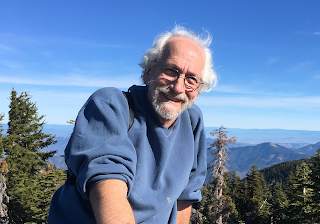I am saddened by the recent death of a friend.
We hardly ever saw each other and communicated seldom, but he was always dear in my heart. He lived on the other side of the continent, so I'm not sure I would have gone to his memorial service, but I know I would have wanted to so I could hear the stories people told of him and to know, in this way, more about him.
.jpg) |
| He looks stern, but behind in that closed mouth his glorious humor peeks out. |
It didn't matter. He didn't want a memorial service.
This is something I don't understand. My late husband also didn't want a memorial service. My anger at these deaths can be displaced onto the dying person himself: how dare you tell us we can't come together to mourn, laugh, and feel a common love through our relationship with you? How dare you deprive us of ways we would like to mourn, remember, and celebrate? What difference does it make to you? The memorial service is not for you. It's for us.
I knew my husband for only six years. Our years of exploring each other's pasts and personalities were cut short, so I was looking forward to a memorial service, where his family would talk about what Mike was like when he was a child, as his children were growing up, as a brother, uncle, father, employer. I was cheated of that greater depth because there was no memorial service, not because Mike had requested there be none (he had agreed to it by the time he died) but because COVID prevented that kind of gathering. My mourning felt incomplete, ragged, solitary.
 |
| From the last hike Mike and I made together. |
A memorial service elicits closure and completion. It is a communal gathering, fellowship displacing the individual mourning in each heart. Rituals at memorial services can be rich experiences—singing songs, releasing (eco-friendly) balloons, planting flowers, eating together. A sudden and tragic death—a young person's suicide—becomes easier to bear when many mourn together.
Years ago, driving to the memorial service for a friend I didn't know well, I wondered why I was going, but at the service the stories from her sister and brother broadened the incomplete picture I had of this person. I was glad I had made the effort to be there.
At the reception after the service for my friend Maren, I was suddenly surrounded by five or six of Maren's students whom I had also taught at the University of Gothenburg. They were there through their love for Maren; now that love surrounded me as well.
At the reception after my sister's service, person after person came up to me to thank me for the help Linda, an occupational therapist, had given their children. Through the memorial service and following reception, I learned more about Linda's life that made me respect and admire her even more.
At my father's memorial service friends and family laughed and told stories and radiated such love I have felt its warmth in my heart all these years.
So, listen, this is what I want to say. Go to the memorial services. Take advantage of this one last chance to know, in many dimensions, this person you loved.
And by all means, when you are dying, don't say you don't want a memorial service. This is for us, not for you.

No comments:
Post a Comment